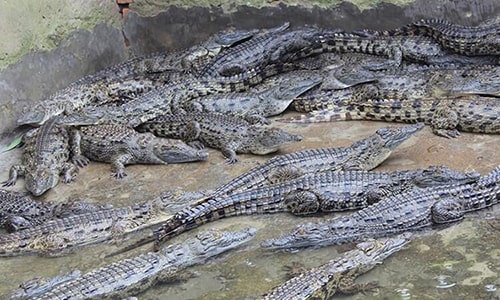Buwama Crocodile Farm Uganda in Mpigi District
 Buwama Crocodile Farm is situated in Mpigi district in the central region of Uganda just 70 kilometers from Kampala, the Capital City of Uganda. Its is one of the places in the country where Crocodile tourism in Uganda can be done.
Buwama Crocodile Farm is situated in Mpigi district in the central region of Uganda just 70 kilometers from Kampala, the Capital City of Uganda. Its is one of the places in the country where Crocodile tourism in Uganda can be done.
The crocodile farm is accessible off Kampala – Masaka Highway, a route to western Uganda. When you reach Buwama town, you will branch off from the main road and move 9 kilometers to reach the farm that serves both commercial and tourism purposes. This reptile farm is anticipated to host over 4000 crocodile species kept according to their age, size and sex.
The farm is situated on Lake Victoria shorelines providing an opportunity for visitors to relax and enjoy the beach life full of water breeze. At this farm, there are some self-contained bandas, which can provide accommodation to the overnight visitors and excursionists. These accommodation bandas range from single to double bed facilities.
Besides watching the crocodiles, the crocs farm has got a number of activities that are carried out at the site including swimming, soccer, swinging, bird watching and nature walk around the place among others. The brave and non-nervous visitors may be given a chance to touch, hold or lift up some baby crocodiles just to have a feel of these much feared reptiles when grown-up.
Being off along Kampala-Masaka-Mbarara highway, the farm visit can be incorporated well in several Uganda safari packages for tourists going to visit some of the national parks or tourist attractions in Western Uganda. These include Lake Mburo, Queen Elizabeth, Bwindi Forest and Mgahinga National Park plus a variety of attractions in the region.
One can visit the farm enroute to or from a Uganda Tour Safari as time may allow. The crocs farm ideal for touring when going to some of the tourist attractions in western Uganda which include Lake Mburo, Queen Elizabeth, Bwindi forest, Lake Bunyonyi or Mgahinga Gorilla National Park. Before or after tour activities to the above destinations would be the best time to turn off Kampala-Masaka highway for a few hours’ crocodile adventure.
Buwama Crocodile Farm sanctuary can also be visited in a one-day tour which starts from Kampala early in the morning and return in the afternoon or evening. Such trip is among the several Uganda short tours that we offer also as a company.
Other Places to see Nile Crocodiles in Uganda
Other places in Uganda where crocodiles can be spotted include Murchison Falls National Park on the banks of River Nile, some shorelines of the mighty Lake Victoria, Queen Elizabeth Park, Semuliki National Park, Lake Mburo Park as well as the Pygmy Nile Crocodiles of the Kidepo Valley Park. Crocodiles are well seen by visitors on boat cruise safaris in the parks.
Activities at Buwama Crocodile Farm
Tourist activities at this site include seeing the feeding of these reptiles that is usually done mainly two days a week. One can also make a nature walk around the place as long as picnicking and enjoying of the crocodile meat, which is said to be very delicious. The place can be visited when you book a 1 day trip to this reptile farm. When visiting the crocs project, you will have an advantage of stopping at the Uganda Equator in Kayabwe along Kampala – Masaka highway for some photo opportunities.
The Importance of Crocodile Tourism in Uganda
Crocodile tourism in Uganda plays a significant role in the country’s economy, conservation efforts, and cultural heritage. Uganda, home to diverse ecosystems and abundant wildlife, offers unique opportunities for tourists to experience the majestic Nile crocodiles in their natural habitat, particularly in national parks like Murchison Falls and Queen Elizabeth. These ancient reptiles, which can be observed basking on riverbanks or hunting in the waters, are a major attraction for eco-tourists and wildlife enthusiasts, making them integral to Uganda’s thriving tourism industry. Below are reasons why crocodile tourism is important to Uganda:-
Economic Contribution
Crocodile tourism significantly impacts Uganda’s economy by generating revenue from entry fees, guided tours, accommodation, and other tourism services. This influx of income supports local businesses and contributes to national economic growth. Moreover, it creates diverse employment opportunities, enabling local communities to benefit directly. Jobs such as tour guides, park rangers, hotel staff, and artisans selling souvenirs ensure that the economic benefits reach a broad spectrum of people.
Conservation Efforts
The focus on crocodiles within tourism promotes awareness and education about their ecological importance, encouraging conservation efforts. Tourists learn about the critical role these reptiles play in their ecosystems, fostering a sense of responsibility toward their preservation. Additionally, the revenue from crocodile tourism often supports conservation initiatives, including habitat restoration, anti-poaching campaigns, and wildlife research.
Biodiversity Importance
Uganda boasts a rich ecosystem, with the Nile crocodile as a prominent species. These crocodiles, thriving in rivers, lakes, and wetlands like the Nile River and Lake Victoria, are apex predators vital to maintaining ecological balance. They help regulate prey populations and contribute to the health of aquatic and terrestrial ecosystems, underscoring their role in biodiversity.
Tourism Destinations
Key destinations for crocodile tourism include Murchison Falls National Park, where Nile crocodiles can be seen basking along the Nile. Queen Elizabeth National Park offers opportunities to view these reptiles during boat cruises on the Kazinga Channel. Additionally, regions like Lake Victoria and Lake Albert provide captivating experiences for tourists interested in crocodile viewing in natural habitats.
Cultural Significance
In Uganda, crocodiles hold symbolic importance in certain communities, representing strength and resilience. This cultural aspect enriches the crocodile tourism experience by blending wildlife observation with educational insights into local traditions and beliefs. Visitors gain a deeper appreciation for the cultural narratives tied to these majestic reptiles.
Diversification of Tourism Products
Crocodile tourism enhances Uganda’s already diverse wildlife tourism offerings, complementing popular activities like gorilla trekking, bird watching, and safaris. By catering to a broader audience of wildlife enthusiasts, it helps diversify the tourism industry, making Uganda a more attractive destination for varied interests.
Challenges and Opportunities
Crocodile tourism faces challenges such as habitat degradation, pollution, and human-wildlife conflicts, which threaten crocodile populations. However, these challenges present opportunities for sustainable tourism development. By investing in eco-friendly practices and fostering coexistence between humans and wildlife, Uganda can address these issues while bolstering the long-term viability of crocodile tourism.
In conclusion, crocodile tourism in Uganda is a vital component of the country’s wildlife tourism sector. It contributes to economic growth, supports conservation, and enriches biodiversity awareness while promoting cultural appreciation. By overcoming challenges through sustainable practices, Uganda can further enhance the benefits of crocodile tourism, fostering a harmonious relationship between wildlife, local communities, and visitors.
